If Americans had access to a magic wand that could instantly change anything about the country, what would we use it for?
We recently asked this question, expecting to hear visions of bold possibility. Maybe sweeping changes to education or healthcare. Maybe new civic institutions, strengthened communities, or a more inclusive economy.
Instead, people told us they would eliminate the government. Dismantle capitalism. Get rid of the IRS. Abolish Congress. Remove political parties. Tear down institutions and systems, often with dramatic flair. They didn’t want to tweak or transform. They wanted to torch it all.
This wasn’t what we expected. But maybe it should have been.
And yet, this helps explain something we’re all sensing: politics isn’t working. Not just in policy, but in emotional resonance. Candidates who offer solutions without acknowledging people’s pain don’t connect. And those who stoke emotion without any path forward leave people feeling even more hopeless or abandoned.
We don’t just need better policies. We need to restore the capacity to imagine that the world can change. America’s promise has always been rooted in the idea of tomorrow. But the data shows: many people can’t see that far ahead anymore.
The Verbs We Reach For
Roughly 28% of responses used what we coded as destructive language. Only 19% used constructive language. Over half didn’t use either and simply listed out an issue or problem. That imbalance tells us something: many Americans aren’t imagining how to build a better future, they’re stuck on what they’d like to see gone.
But the verbs themselves? They’re fascinating.
Some are blunt, even violent: rid. remove. eliminate. abolish. destroy. Others are sneakier, more coded: send (as in “send them back”). erase. disappear. Meanwhile, the constructive lexicon leans earnest and solution-oriented: increase. create. raise. fix. improve. change.
When Language Is a Wrecking Ball
When people say they want to burn something down, it’s rarely about fire for fire’s sake. It's about despair. Disillusionment. A sense that the systems in place—whatever they are—are too broken to salvage.
Most of the destructive language we saw had specific targets. As shown below, nearly half of all such responses were aimed at a specific person or political figure, and another fifth were targeted at a political group or institution. But another 15% focused on social groups, which was a category that included immigrants, billionaires, religious communities, and racial or ideological identities.
We’re not including direct quotes from the most hateful responses in this section. Not because they don’t matter but because reading them was hard. Reprinting them would be worse. The vitriol directed at individuals and groups was often dehumanizing.
Perhaps, fortunately, this wasn’t just about individuals. People also targeted deeper political dynamics and structures, illustrated here:
Whether the target is the economy, the media, the courts, the police, the tax code, or the two-party system, the underlying feeling is the same: the structure itself is the problem, and meaningful change feels impossible unless it is first leveled.
Words That Want to Build
Some used their magic wand to envision what could be built. On the other end of the spectrum, 19% used constructive framing. As shown below, half of these responses focused on the economy, especially around cost of living, jobs, and housing. Another fifth centered on policy or social issues, with strong themes around education, healthcare, and support for seniors. And notably, 16% explicitly focused on unity, kindness, or emotional repair. This is a category that rarely appears in most political discourse, but showed up here again and again.
In these responses, the verbs were softer, steadier. The tone is less reactionary and more relational. So while the ideas weren’t always sweeping, they were almost always sincere. Here’s what it sounds like when people imagine change not as destruction, but as construction:
In a time of so much noise, these voices whisper something rare: not just what’s broken, but what might still be mended.
Final Thoughts
This wasn’t a scientific experiment. But it did reveal something fundamental about the way many Americans are feeling right now. When people are given the chance to dream freely—without rules, constraints, or political calculations—they don’t always imagine something new.
The words we use are showing the edges of something deeper: a country wrestling not just with what it wants to change, but how it even imagines change. This raises questions that have lingered with us:
Has algorithmic outrage narrowed the vocabulary of change?
Is our language of destruction limiting our capacity to imagine something better?
Are we mistaking sharp words for real solutions?
When so many are focused on survival, do we even have the capacity to dream anymore?
Of course, not everyone used their wand to reshape democracy or abolish institutions. Some aimed it squarely at the thermostat. Or their job. A few waved it toward palm trees and escape:
"I would take that magic wand and transport myself to Bali or somewhere tropical so I didn't have to deal with the political mess the USA is." — 35, Female, Republican, Butte, CA
These off-topic answers may seem frivolous. But they reflect something too: a sense that politics is no longer the arena for meaningful change. If you think no wand can fix what’s broken, or if you think the real problems are too deep or too far gone, it’s easier to joke, deflect, or dream of escape.
The wand is hypothetical. But the desire behind it is not.



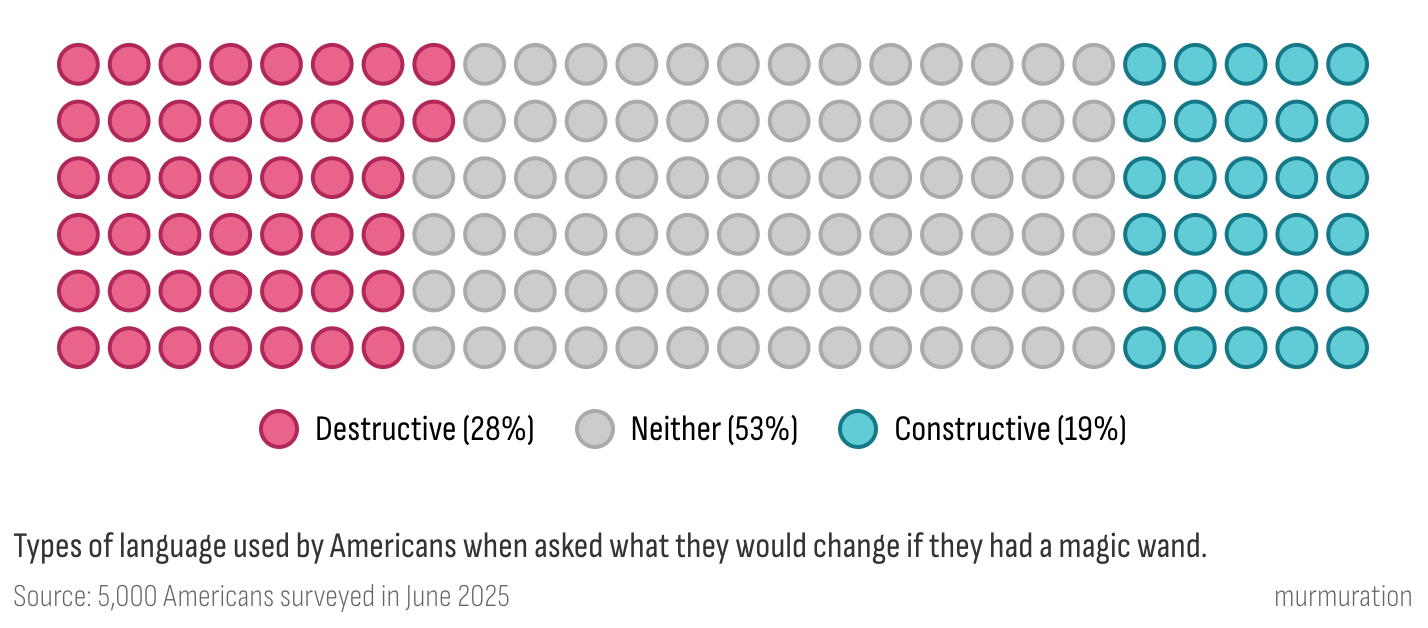
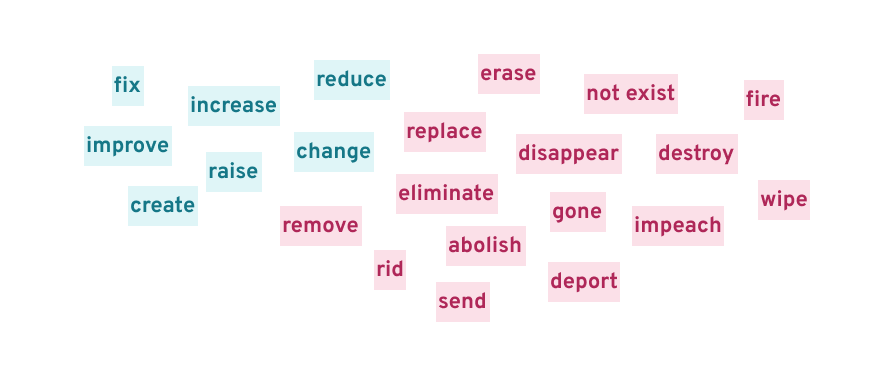
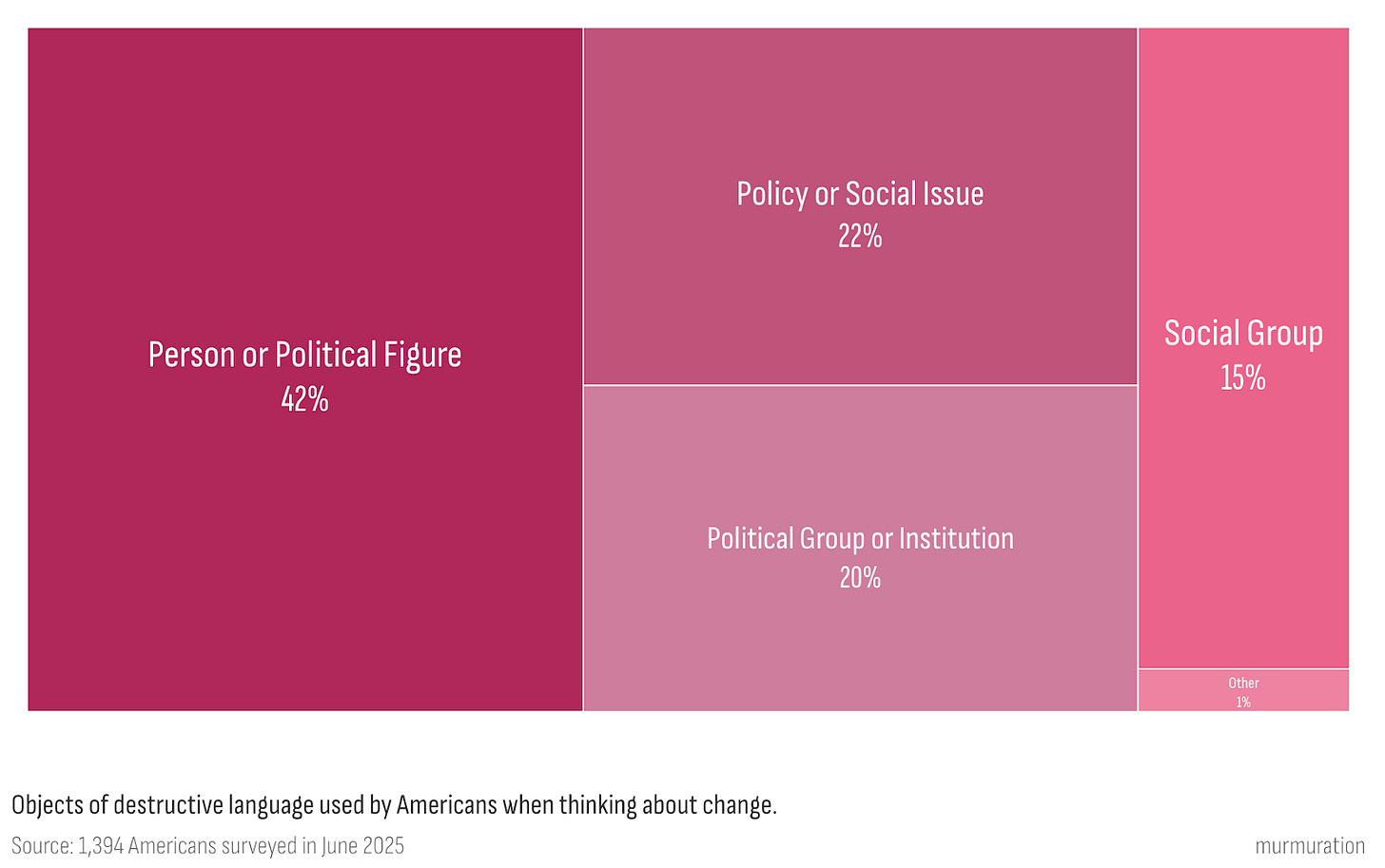
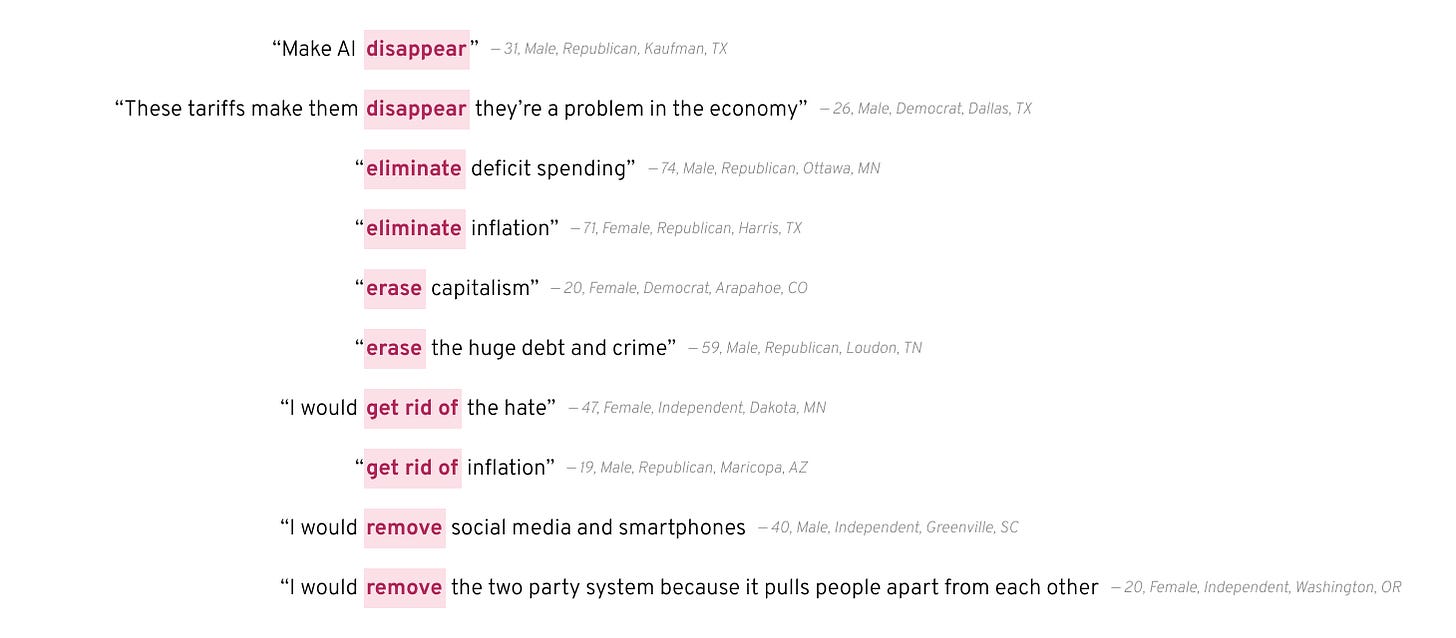
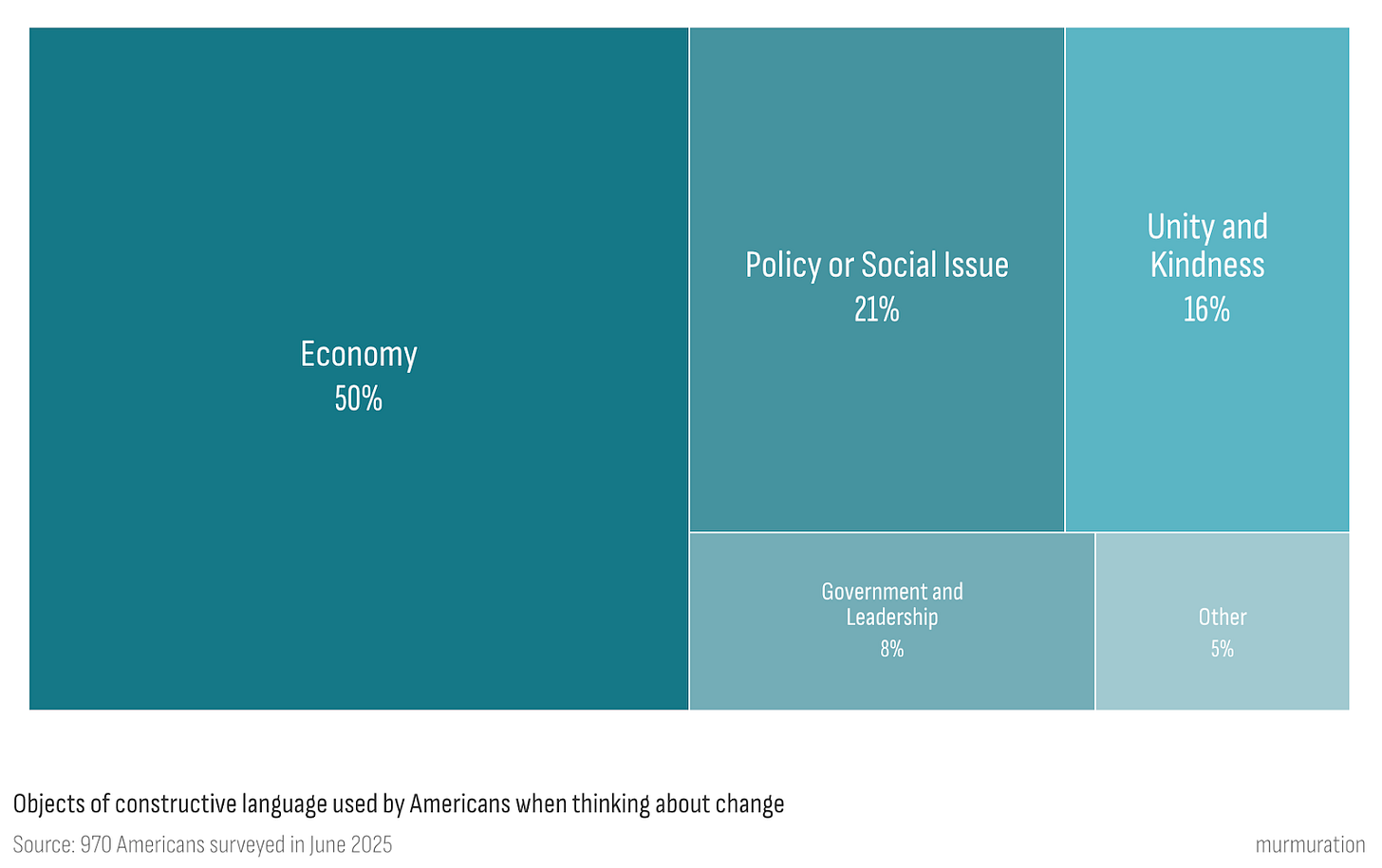
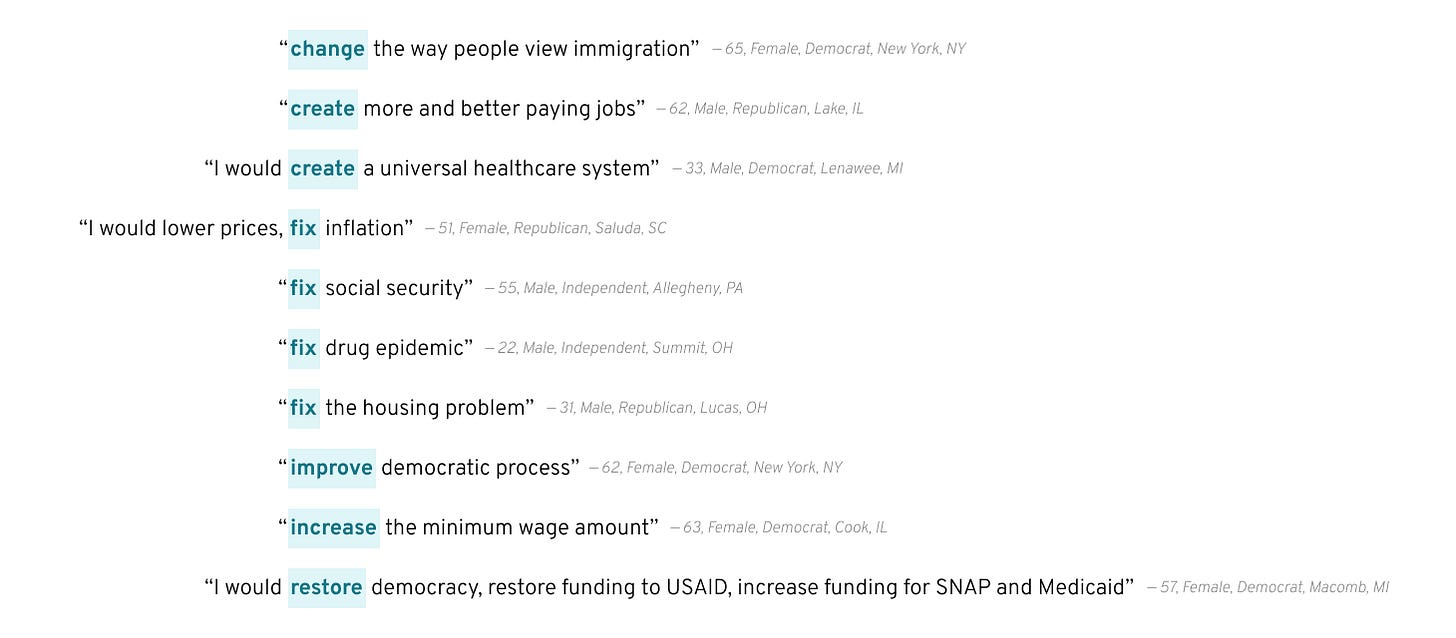
This piece is both sobering and inspiring, Sarah. Thank you for sharing the research and for asking the kind of questions that matter. The data reflects what I have witnessed through my work on political campaigns and with advocacy organizations like Oxfam: people are exhausted and increasingly convinced that the systems shaping their lives are beyond repair. When destruction becomes the dominant verb, it is not apathy. It is despair.
What struck me most about this exercise was how freeing it felt to step outside the troubling reality and use my imagination, to consider not just what is, but what I wish could be. If I had that magic wand, I would take us back to the foundation, to a place where we value our shared humanity more than our divisions. Where our differences do not fracture us but fuel collaboration. Where care for one another is the cornerstone, not the afterthought.
We need better policies, absolutely. But equally important is restoring our collective capacity to dream, to imagine a future worth building together.